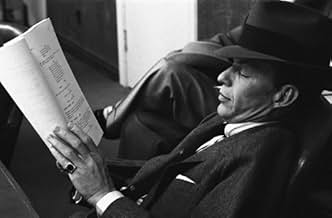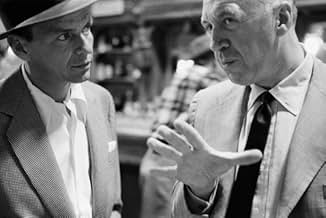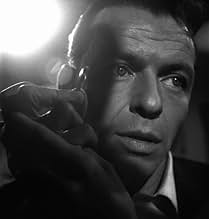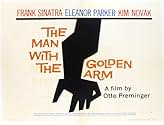VALUTAZIONE IMDb
7,3/10
12.846
LA TUA VALUTAZIONE
Un tossico deve affrontare la sua vera identità per combattere la sua dipendenza.Un tossico deve affrontare la sua vera identità per combattere la sua dipendenza.Un tossico deve affrontare la sua vera identità per combattere la sua dipendenza.
- Regia
- Sceneggiatura
- Star
- Candidato a 3 Oscar
- 3 vittorie e 8 candidature totali
Jered Barclay
- Junkie in Lock-Up
- (non citato nei titoli originali)
Leonard Bremen
- Cabbie in Lock-Up
- (non citato nei titoli originali)
Paul E. Burns
- Suspenders in Lock-Up
- (non citato nei titoli originali)
Pete Candoli
- Jazz Musician
- (non citato nei titoli originali)
Herschel Graham
- Club Safari Patron
- (non citato nei titoli originali)
Harold 'Tommy' Hart
- Officer Kvorka
- (non citato nei titoli originali)
Recensioni in evidenza
I loved that this movie takes place on an imaginary block of an imaginary city. You could say the streets represents a state of mind just like the title of
Chinatown did two decades later. Here degeneracy and addiction are the
norm. This place sucks you in and wont let go. It's here that Sinatra must face his demons when he returns home after getting clean at a rehab clinic. The film ends up being just as much about moving on from the past as it does about drug addiction.
Sinatra's junky is a bit amorphous, we never really learn whether he grew up here or what led him to his addictions. However, the story is strong and told with a nice brisk pace. There are some real memorable moments (the Gambling
sequence, Frankie coming off smack, etc). Preminger's direction is great, some subtle camera work adds a lot to a number of scenes. Elmer Berstein's score
and Saul Bass' titles perfectly set the mood. Overall, an endearing film you should check out.
Chinatown did two decades later. Here degeneracy and addiction are the
norm. This place sucks you in and wont let go. It's here that Sinatra must face his demons when he returns home after getting clean at a rehab clinic. The film ends up being just as much about moving on from the past as it does about drug addiction.
Sinatra's junky is a bit amorphous, we never really learn whether he grew up here or what led him to his addictions. However, the story is strong and told with a nice brisk pace. There are some real memorable moments (the Gambling
sequence, Frankie coming off smack, etc). Preminger's direction is great, some subtle camera work adds a lot to a number of scenes. Elmer Berstein's score
and Saul Bass' titles perfectly set the mood. Overall, an endearing film you should check out.
We have moved far beyond this tentative foray into a forbidden area-drug addiction-for the 1950s. As such, the film may seem dated. The Man with the Golden Arm served its function is peeling back a layer of the underside of society, an eye-opener to a Southern country boy in 1955 when I first viewed this film in the theater. After some serious consideration about being too young, I was allowed to go. It was powerful and affecting then and still maintains some sharp, painful moments of the soul stripped naked. As a movie depicting the loneliness at the core of being, it succeeds.
Filled with angst, Frank Sinatra, in his best role, creates a vulnerability that makes him sympathetic to the viewer. He conveys his helplessness and ineffectualness in a beautifully restrained performance. As a voice of common sense in the dead-end urban jungle, Kim Novak as Molly is quite good. She is compassionate and yet stands on solid ground. The interaction between Sinatra and Novak is really good. Darren McGavin plays a slimy character and does it very well. Eleanor Parker is superbly irritating and painfully insecure in her role of the pathetic Zosch, the crippled wife of Sinatra. Arnold Stang is another unlikely survivor of the street. Regarded as pitiful and despicable, his character Sparrow provides tart comedic moments.
The music is almost the star of this film-brooding, frenetic, moody, poignant. Elmer Bernstein's score perfectly accentuates the tensions of Frankie Machine's spiritual weakness and physical need for heroin. Molly's theme is bittersweet and captures aurally what the film depicts visually. I know of no other soundtrack that effectively complements the tension and defeat within a man as effectively as does this one.
Filled with angst, Frank Sinatra, in his best role, creates a vulnerability that makes him sympathetic to the viewer. He conveys his helplessness and ineffectualness in a beautifully restrained performance. As a voice of common sense in the dead-end urban jungle, Kim Novak as Molly is quite good. She is compassionate and yet stands on solid ground. The interaction between Sinatra and Novak is really good. Darren McGavin plays a slimy character and does it very well. Eleanor Parker is superbly irritating and painfully insecure in her role of the pathetic Zosch, the crippled wife of Sinatra. Arnold Stang is another unlikely survivor of the street. Regarded as pitiful and despicable, his character Sparrow provides tart comedic moments.
The music is almost the star of this film-brooding, frenetic, moody, poignant. Elmer Bernstein's score perfectly accentuates the tensions of Frankie Machine's spiritual weakness and physical need for heroin. Molly's theme is bittersweet and captures aurally what the film depicts visually. I know of no other soundtrack that effectively complements the tension and defeat within a man as effectively as does this one.
I've always enjoyed Frank Sinatra's music, and just recently I wrote a term paper about his life story. I've been fascinated by the life and legend of Ol' Blue Eyes. However, I've never seen any of his movies. So I wanted to see if his acting was as great as his singing. Well...it was! I was blown away by his performance in this movie! He really does a tremendous job as recovering heroin addict Frankie Machine, who's trying to put his life back together and audition as a drummer for a local band.
Otto Preminger's direction is great as well. I haven't seen any of his other movies. I read his biography on the IMDB. He seems like one of those directors who was sorely misunderstood, and people had conflicted thoughts about him. Seems like the kind of person who appeals most to cult enthusiasts. I haven't seen enough of his films to know for sure if he's really brilliant, but now I'm curious. I want to see more of his films, because judging by his attempt with "The Man with the Golden Arm" this guy has talent. I also loved the music for this movie. The score definitely contains the kind of music that I'll remember if I ever happen to hear it again. That's when you know you have a great score.
The supporting performances are fine as well, including Darren McGavin as the local drug pusher, Eleanor Parker as Frankie's wheelchair-bound wife and Kim Novak as his lover.
It's interesting to see how filmmakers handled the subject of drug abuse, as opposed to modern attempts in films like "Trainspotting" and "Requiem for a Dream." Back in 1955, just mentioning the word "drugs" caused controversy, and if you watch the film they kept the subject on a very discreet level. There's only one scene where Frankie is actually getting heroin injected into his arm, and they showed a close-up of the reaction of his face rather than showing the needle graphically poking into his veins. But it delivered its message without making it feel watered-down. In a powerful drama like this, with powerful performances and direction like this, you don't need graphic portrayals of drug abuse to keep the audience intrigued.
"The Man with the Golden Arm" is a dramatic gem that all film buffs should check out. It really is an amazing piece of work!
My score: 8 (out of 10)
Otto Preminger's direction is great as well. I haven't seen any of his other movies. I read his biography on the IMDB. He seems like one of those directors who was sorely misunderstood, and people had conflicted thoughts about him. Seems like the kind of person who appeals most to cult enthusiasts. I haven't seen enough of his films to know for sure if he's really brilliant, but now I'm curious. I want to see more of his films, because judging by his attempt with "The Man with the Golden Arm" this guy has talent. I also loved the music for this movie. The score definitely contains the kind of music that I'll remember if I ever happen to hear it again. That's when you know you have a great score.
The supporting performances are fine as well, including Darren McGavin as the local drug pusher, Eleanor Parker as Frankie's wheelchair-bound wife and Kim Novak as his lover.
It's interesting to see how filmmakers handled the subject of drug abuse, as opposed to modern attempts in films like "Trainspotting" and "Requiem for a Dream." Back in 1955, just mentioning the word "drugs" caused controversy, and if you watch the film they kept the subject on a very discreet level. There's only one scene where Frankie is actually getting heroin injected into his arm, and they showed a close-up of the reaction of his face rather than showing the needle graphically poking into his veins. But it delivered its message without making it feel watered-down. In a powerful drama like this, with powerful performances and direction like this, you don't need graphic portrayals of drug abuse to keep the audience intrigued.
"The Man with the Golden Arm" is a dramatic gem that all film buffs should check out. It really is an amazing piece of work!
My score: 8 (out of 10)
A solid drama to begin with, "The Man With the Golden Arm" is particularly worthwhile for Frank Sinatra's performance as Frankie Machine. The movie was well-conceived, and it would probably have been worth seeing with any decent lead, but Sinatra makes it even better. The story is interesting and at times compelling, as Frankie struggles against himself and his circumstances.
The story is told from the viewpoint of its era, yet the basic elements are timeless enough that the story still holds up very well. The details of Frankie's situation are less important than the general themes of him battling his own desires while also contending against "friends" who simply want to use him for their own purposes.
Sinatra was good at this kind of role, as a character with his own inner demons who must also face hostile surroundings. He channels his nervous energy into expressions and gestures that convey well what is going on inside him. The actor Sinatra deserves to be remembered for roles like this one and his roles in "The Manchurian Candidate" and "From Here to Eternity", rather than for the insubstantial 'Rat Pack' features.
The supporting cast have simpler roles, but they do their jobs satisfactorily. The story moves at a good pace, and it is complemented by an Elmer Bernstein score which, though sometimes jarring, is appropriate. The combination works well as a whole.
The story is told from the viewpoint of its era, yet the basic elements are timeless enough that the story still holds up very well. The details of Frankie's situation are less important than the general themes of him battling his own desires while also contending against "friends" who simply want to use him for their own purposes.
Sinatra was good at this kind of role, as a character with his own inner demons who must also face hostile surroundings. He channels his nervous energy into expressions and gestures that convey well what is going on inside him. The actor Sinatra deserves to be remembered for roles like this one and his roles in "The Manchurian Candidate" and "From Here to Eternity", rather than for the insubstantial 'Rat Pack' features.
The supporting cast have simpler roles, but they do their jobs satisfactorily. The story moves at a good pace, and it is complemented by an Elmer Bernstein score which, though sometimes jarring, is appropriate. The combination works well as a whole.
The Man with the Golden Arm was one of the first films to have as its main topic (and, in some respects, the message) the tragedy of heroin addiction. It's nowhere near a great film, but its importance lies in Otto Preminger's dedication to making it feel real and on the edge of melodrama and naturalism. What I liked is that it's not so much an expose of junkies (if you want the best expose of that read Naked Lunch, if you can get through it anyway, besides the point), but the nature of the urban environment Frankie Machine lives. He expects after he gets out of prison for dealing to go on the straight and narrow, to become a drummer in a band and make it legit as a musician. But he has his "crippled" wife Zosch, who can't work and needs money and often complains, and then there's the old neighborhood- he can't escape seeing Louie (Darren McGavin), who is still doing back-room card games and, yes, pushing dope. Like Mean Streets, it's hard to escape the minutia unless you leave.
But then again, it's hard for Frankie Machine not to try and operate naturally in this urban quarter. It's just that he can't escape the temptation of junk (when he's booked on a phony theft charge with his friend, he sees a junkie freaking out, and it puts back the fear of going back on into his clean self). And personifying Frankie is Sinatra, and I can't see anyone else who could've played him, even original choice Brando. He fits into the neighborhood, and seems like the kind of guy who should be a step ahead of the game. But there's also a vulnerability to Sinatra that he pulls out wonderfully, and by the time we see him going 'cold turkey' in Molly's apartment, it's believable even if it's not the kind of thing those from 'my' generation would think of heroin (i.e. Trainspotting and certainly Requiem for a Dream). If for nothing else, you want to watch the movie to see what happens to Sinatra as this character.
The flaws, however, come in some of the other performances, though it's a little tricky. Eleanor Parker seems to be overacting for a good portion of the movie, fooling Frankie that she's really crippled when in reality she can walk and is fooling him for one reason or another. But then it becomes clearer as it goes along- she's supposed to be nuts, and nuts with jealousy, and on that level it starts to get better. Meanwhile, Kim Novak is good, though not Vertigo-worthy, as the possible girl in the side but more like the voice of reason in the story. Then there's a Detective Bendar, who might be one of the most one-note characters/performances, ever. And also Sparrow, Frankie's nerdy friend, and the characters of Louie and Schiefka, and they're all played as one might expect them to (actually, McGavin is better than OK). As far as casting other talent around Sinatra, Preminger doesn't do all that great. And, frankly, some scenes kind of fall flat.
But there's a lot of fascination in the Man with the Golden Arm, and not just as some dated piece of sociological interest. It works as compelling drama, and as a message piece conveyed without being preachy or campy. It's a genuine article, just not exceptional.
But then again, it's hard for Frankie Machine not to try and operate naturally in this urban quarter. It's just that he can't escape the temptation of junk (when he's booked on a phony theft charge with his friend, he sees a junkie freaking out, and it puts back the fear of going back on into his clean self). And personifying Frankie is Sinatra, and I can't see anyone else who could've played him, even original choice Brando. He fits into the neighborhood, and seems like the kind of guy who should be a step ahead of the game. But there's also a vulnerability to Sinatra that he pulls out wonderfully, and by the time we see him going 'cold turkey' in Molly's apartment, it's believable even if it's not the kind of thing those from 'my' generation would think of heroin (i.e. Trainspotting and certainly Requiem for a Dream). If for nothing else, you want to watch the movie to see what happens to Sinatra as this character.
The flaws, however, come in some of the other performances, though it's a little tricky. Eleanor Parker seems to be overacting for a good portion of the movie, fooling Frankie that she's really crippled when in reality she can walk and is fooling him for one reason or another. But then it becomes clearer as it goes along- she's supposed to be nuts, and nuts with jealousy, and on that level it starts to get better. Meanwhile, Kim Novak is good, though not Vertigo-worthy, as the possible girl in the side but more like the voice of reason in the story. Then there's a Detective Bendar, who might be one of the most one-note characters/performances, ever. And also Sparrow, Frankie's nerdy friend, and the characters of Louie and Schiefka, and they're all played as one might expect them to (actually, McGavin is better than OK). As far as casting other talent around Sinatra, Preminger doesn't do all that great. And, frankly, some scenes kind of fall flat.
But there's a lot of fascination in the Man with the Golden Arm, and not just as some dated piece of sociological interest. It works as compelling drama, and as a message piece conveyed without being preachy or campy. It's a genuine article, just not exceptional.
Lo sapevi?
- QuizFrank Sinatra jumped at a chance to star in the film before reading the entire script.
- BlooperIn a scene about twenty minutes in, as the camera exits the bar following Frankie, the jukebox can be seen to slide out of the way of the camera at the bottom of the screen.
- ConnessioniEdited into Bass on Titles (1982)
I più visti
Accedi per valutare e creare un elenco di titoli salvati per ottenere consigli personalizzati
- How long is The Man with the Golden Arm?Powered by Alexa
Dettagli
- Data di uscita
- Paese di origine
- Lingua
- Celebre anche come
- El hombre del brazo de oro
- Luoghi delle riprese
- Azienda produttrice
- Vedi altri crediti dell’azienda su IMDbPro
Botteghino
- Budget
- 1.000.000 USD (previsto)
- Lordo in tutto il mondo
- 4652 USD
- Tempo di esecuzione1 ora 59 minuti
- Colore
- Proporzioni
- 1.85 : 1
Contribuisci a questa pagina
Suggerisci una modifica o aggiungi i contenuti mancanti

Divario superiore
By what name was L'uomo dal braccio d'oro (1955) officially released in India in English?
Rispondi



































